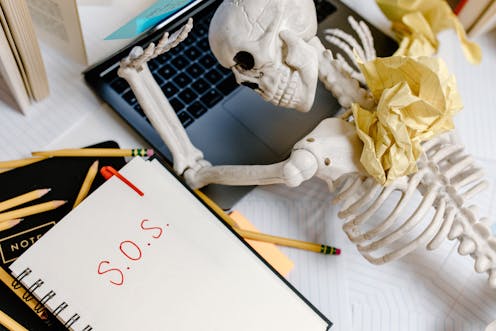The 'great resignation' didn't happen in Australia, but the 'great burnout' did
- Written by Leah Ruppanner, Professor of Sociology and Founding Director of The Future of Work Lab, The University of Melbourne

You’ve probably heard about the “great resignation[1]” which saw large numbers of people resigning from their jobs in the US in 2021 and 2022.
We didn’t see resignations over and above what is normal in Australia. However, we did see workers resisting the post-COVID return to the office.
To better understand these trends, we conducted a study[2] of 1,400 employed Australians in 2022 to see how they were faring two years after the start of the pandemic.
And the answer is: not great.
Australian workers are in poorer physical and mental health since the pandemic across all ages and stages. And prime-aged workers – those between 25 and 55 – are reporting the greatest burn-out.
Some 50% of prime-aged workers in our survey feel exhausted at work. About 40% reported feeling less motivated about their work than pre-pandemic, and 33% found it more difficult to concentrate at work because of responsibilities outside of work.
They also see fewer opportunities for advancement than older workers and are more likely to feel like they don’t have enough time at work to do everything they need to do.
It’s perhaps no surprise 33% of this prime-aged workforce is thinking about quitting. These workers may be showing up to their jobs but they are definitely burnt out. They are the “quiet quitters[3]” and they are sounding the alarm bell.
Read more: Extinguished and anguished: what is burnout and what can we do about it?[4]
Why are workers burnt out?
The pandemic, particularly lockdowns, took a significant toll on the mental health of the Australian workforce. Although we’ve been desperately waiting for life to return to “normal”, pandemic-related disruptions remain.
Our previous research during the pandemic showed women[5] and parents[6] were particularly vulnerable. We found mothers[7] stepped into the added childcare and housework driven by pandemic lockdowns. We discovered fathers also did more housework and child care[8] over the first year of the pandemic.
The consequence of all of this added work was poorer mental health[9] – worse sleep, less calm, more anxiety.
We also showed this intensified[10] women’s economic precarity, leading to reduced contributions to superannuation and fear of jobs being lost without the skills to re-enter employment.
Women are increasingly concentrated[11] in industries such as nursing, childcare workers and primary school teachers, all of which were particularly impacted by the pandemic. Young prime-aged women[12] were particularly impacted during the early period of the pandemic and lockdowns.
The pandemic was unforeseen, severe and detrimental to our working lives. Many Australia workplaces and workers continue to be impacted as the pandemic continues. Higher numbers of workers are taking sick leave[13], which may in part be driven by exhaustion and other COVID-related reasons.
Where do we go from here?
Australian workers in our survey have some clear solutions. They found access to flexible work particularly valuable for their working lives. In our study[15], we found flexible workers had more energy for their work and a greater motivation to do their jobs. They reported more time to complete their tasks.
Around 40% of all flexible workers reported feeling more productive since the start of the pandemic, compared to around 30% of non-flexible workers.
And 75% of workers under the age of 54 reported that a lack of flexible work options in their workplace would motivate them to leave or look for another job.
Flexible work is working for many in the Australian workforce. Australian employers would do well to identify ways to expand its reach to a larger segment of the workforce or risk suppressed productivity and loss of their workers.
Read more: We're all exhausted but are you experiencing burnout? Here's what to look out for[16]
2 important take-aways
As we rush to return to pre-pandemic “normal”, our report identifies two critical points.
The Australian workforce is burnt-out and exhausted. We need to acknowledge the trauma of the pandemic is lingering and identify clear solutions to support this exhausted, fatigued and overexerted workforce.
We must understand pre-pandemic ways of working didn’t work for many. It especially didn’t work for mothers. It didn’t work for caregivers. It didn’t work for people living with chronic illness. It didn’t work for groups vulnerable to discrimination at work. It didn’t work for people forced to commute long distances. So, going “back to normal” means continued disadvantage for these groups.
This means creating new ways of working, including flexible work, is essential to ensuring the Australian workforce has the energy for tomorrow and the next major challenge we will face.
Read more: Are you burnt out at work? Ask yourself these 4 questions[17]
References
- ^ great resignation (www.weforum.org)
- ^ study (www.work-futures.org)
- ^ quiet quitters (www.newyorker.com)
- ^ Extinguished and anguished: what is burnout and what can we do about it? (theconversation.com)
- ^ women (journals.sagepub.com)
- ^ parents (journals.sagepub.com)
- ^ mothers (journals.sagepub.com)
- ^ housework and child care (onlinelibrary.wiley.com)
- ^ poorer mental health (theconversation.com)
- ^ intensified (opal.latrobe.edu.au)
- ^ concentrated (theconversation.com)
- ^ Young prime-aged women (onlinelibrary.wiley.com)
- ^ sick leave (www.abs.gov.au)
- ^ CC BY (creativecommons.org)
- ^ study (www.work-futures.org)
- ^ We're all exhausted but are you experiencing burnout? Here's what to look out for (theconversation.com)
- ^ Are you burnt out at work? Ask yourself these 4 questions (theconversation.com)

















